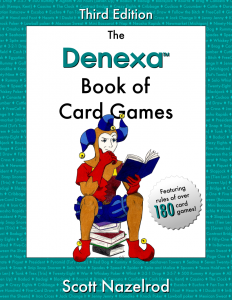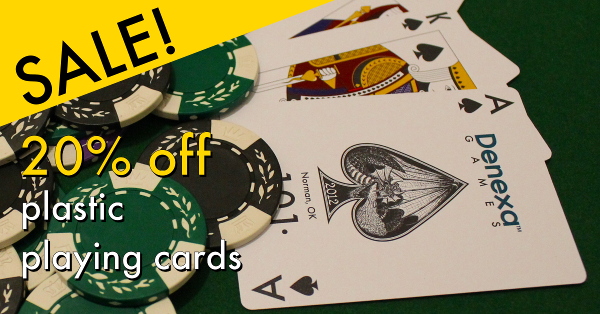Solo Whist
Solo Whist is a trick-taking game for four players. Whereas Whist is a strategic partnership game, Solo Whist provides a more relaxed, accessible, non-partnership alternative.
Solo Whist gained popularity as a Whist alternative in the late 19th century. Solo Whist was particularly popular on the commuter rail of the era, where its structure made it possible for travelers to easily join and drop out of the game as they boarded or departed the train.
Although Solo Whist is sometimes just called Solo, there is another game by that name: Solo (Ombre), which derives from the French game Manille, rather than Whist.
Object of Solo Whist
The object of Solo Whist is to successfully estimate the strength of one’s hand and accurately place a bid for the hand. If one doesn’t successfully win the bidding, the object is to stop the winner from completing the bid.
Setup
Solo Whist is played with a standard 52-card deck. While you could use any manner of 52-card deck out there, if you want a deck that’s durable enough to last through any game, always use Denexa 100% Plastic Playing Cards.
Solo traditionally handles scoring through counters of some form, such as poker chips. If the players desire, each counter can be purchased in an initial buy-in and represent some amount of real money. Otherwise, the counters can serve as valueless MacGuffins. Score can also be kept with pencil and paper.
Shuffle and deal thirteen cards to each player in sets of three, with the thirteenth card being dealt by itself. The dealer’s thirteenth card, the last card in the deck, is turned face-up. The suit of this card is considered the default suit for this hand.
Game play
Bidding
Each hand begins with a bidding round, with the player to the dealer’s left opening the bidding. Players may make any of the following bids, from lowest to highest:
- Prop (1 credit): Player makes a proposal to join in a temporary alliance with any other player in an attempt to capture eight tricks. So long as no higher bid has been made, any other player may respond with “Cop”, accepting the proposal and joining the alliance, should the bid not be overcalled. The default suit becomes trump.
- Solo (1 credit): The player will win five tricks, playing alone. The default suit becomes trump.
- Misère (2 credits): The player will lose all thirteen tricks, playing alone. There is no trump.
- Abundance (3 credits): The player will win nine tricks, playing alone. If the bid is successful, the player will name any suit desired as trump.
- Abundance in Trump (3 credits): The same as an abundance, but using the default suit as trump.
- Misère Ouverte (4 credits): The same as a misère, but the player must play with their hand exposed after the first trick.
- Slam (6 credits): The player will win all thirteen tricks, playing alone. There is no trump, and the player leads to the first trick.
A bid may only be overcalled by a higher bid. Players may also elect to pass; upon passing, a player cannot rejoin in the bidding for this hand. (There is one exception: if the player to the dealer’s left passes, the next player bids Prop, and the remaining players pass, the player to the left of the dealer has the option to call “Cop”.) Bidding continues as long as necessary: until there has been both a Prop and a Cop, or any higher bid, and all other players pass.
If all four players pass, the hand is abandoned and a new hand is dealt by the same dealer. If a player bids Prop and no other player accepts the bid by calling “Cop,” the bidder has the option to change their bid to any higher bid. If they decline, the deal is abandoned.
The successful bidder or bidders become the declarer(s), and the other players become the defenders. The defenders’ goal is to prevent the declarers from fulfilling their contract.
Play of the hand
After bidding concludes, the dealer takes their thirteenth card into their hand, and the player to the dealer’s left leads to the first trick, unless the bid was slam, in which case the declarer leads. Players must follow suit unless they are unable, in which case they may play any card, including a trump. Tricks are won by the player who played the highest card of the suit led, or if the trick contains a trump, the highest trump. Collected tricks are not added to the player’s hand, but are placed face-down in a won-tricks pile in front of the player, with succeeding tricks placed at right angles to one another to allow them to be counted later. (If the contract is Prop, the declarers may stack their tricks in a single pile in front of one of the partners, rather than maintaining separate stacks).
After the first trick is concluded, but before the second trick begins, the declarer must spread their hand face-up if the contract is Misère Ouverte.
When all thirteen tricks have been played out, the declarer counts their tricks to determine whether the contract was made or broken. If it was made, all defenders pay the declarer the amount of their contract (for a made Prop bid, a defender must pay one credit each to both of the declarers). If the declarer(s) failed, they must pay the amount of their contract to each defender. (If keeping score with pencil and paper, simply score the amount of the contract under each declarer if successful or under each defender if not successful.)


